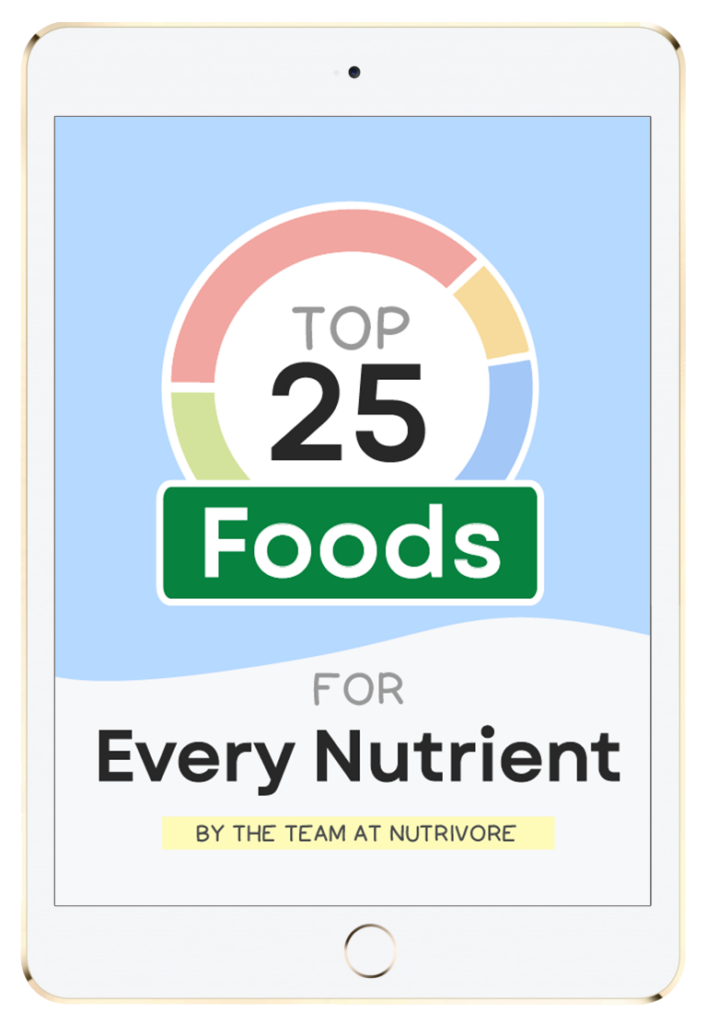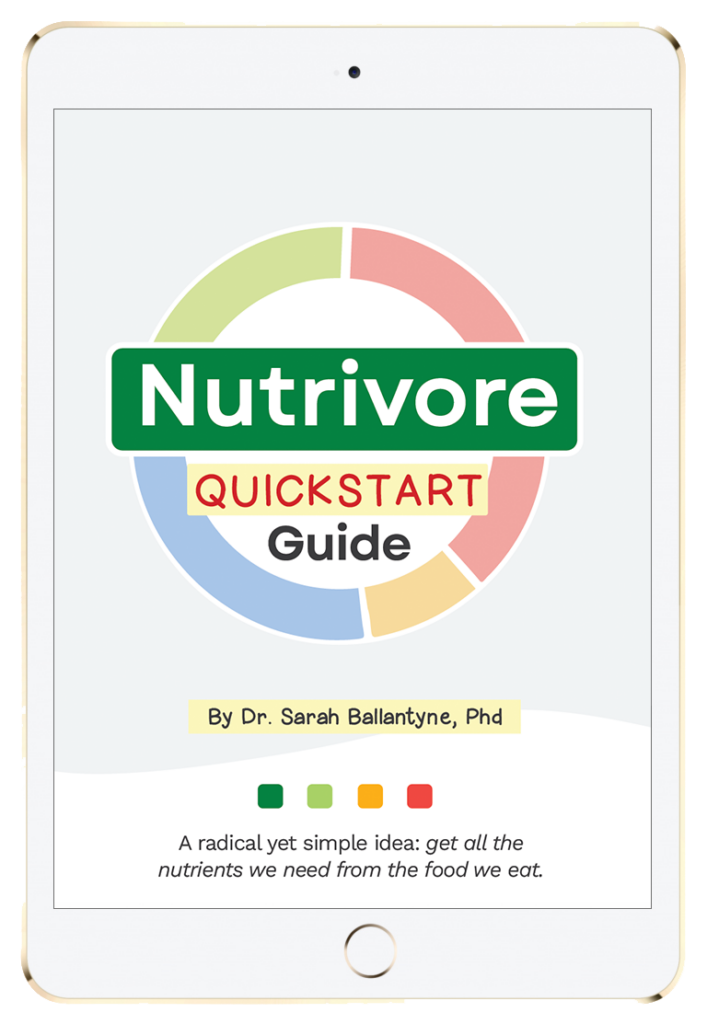Approximately one third of Americans take a daily multivitamin. Is this doing any good? Scientific studies tell us, probably not.
Given that there’s an established link between essential vitamin and mineral deficiencies and increased risk of chronic disease (see The Link Between Nutrients and Disease Risk), and that studies have confirmed lower prevalence of some nutrient deficiencies among middle aged and older adults who take a daily multivitamin, it would be reasonable to posit that taking a multivitamin would reduce risk of chronic disease. However, a vast collection of high-quality studies have failed to show any protective impact from taking a daily multivitamin.
Multivitamins Don’t Improve Health Outcomes
If taking a daily multivitamin substantially improves our health, we’d expect to see a signal in the most prevalent chronic conditions, most notably cancer and cardiovascular disease incidence. We’d also expect to see a decrease in all-cause mortality, an indirect way to measure overall health and longevity that is used by scientists to determine if something is good or bad for us, on average. Not only do individual studies fail to show a benefit effect of multivitamins to these health measures, but so too do large meta-analyses, which pool together data from many studies in order to have higher statistical power and show where the majority of data lies.
An important 2013 meta-analysis, which analyzed data from 27 studies involving over 450,000 participants, showed that multivitamins had absolutely no effect on all-cause mortality (a general marker of health and longevity) nor on mortality associated with cardiovascular disease. The study further concluded that multivitamins provided no significant benefit in preventing heart disease, stroke, or cancer, reinforcing the idea that obtaining nutrients from whole foods is more beneficial for long-term health.
A 2018 meta-analysis , which reviewed data from 18 studies involving over 2 million participants, showed that multivitamin and multimineral supplements provided absolutely no benefit to cardiovascular disease incidence or outcomes, including coronary heart disease and stroke. The analysis concluded that supplementation did not significantly reduce the risk of major cardiovascular events, myocardial infarction, or stroke, nor did it lower mortality from cardiovascular causes. Researchers emphasized that dietary supplementation should not be considered a substitute for a nutrient-dense diet rich in whole foods.
A 2013 systematic review, which analyzed data from 26 studies involving over 300,000 participants, showed no benefit of vitamin and mineral supplements in the prevention of cardiovascular disease or cancer. The review found that neither individual nor combined supplementation had a meaningful impact on reducing cardiovascular disease or cancer risk, again reinforcing the importance of obtaining essential nutrients through a well-balanced diet rather than relying on supplements. Similarly, the Physicians’ Health Study II, which followed nearly 15,000 male physicians over more than a decade, found only a modest reduction in total cancer incidence but no effect on cancer mortality. Large prospective studies have confirmed no protective effect of multivitamins against a wide variety of cancers in both men and women.
More recently, a 2024 cohort study published in JAMA Network Open analyzed data from 390,124 generally healthy adults over more than 20 years. The study examined various health parameters, including cardiovascular disease incidence, cancer rates, and all-cause mortality. It found no statistically significant differences in these outcomes between regular multivitamin users and non-users. The results suggest that, while multivitamins may help prevent overt deficiencies, they do not appear to meaningfully impact long-term disease risk or lifespan.
Consuming sufficient vitamin A, vitamin K, magnesium, zinc and copper from food—but not from supplements—reduced all-cause mortality and mortality associated with cardiovascular disease.
An important 2019 study helped to shed some light on this question by comparing the health impact of nutrients from foods versus supplements. This study revealed that consuming sufficient vitamin A, vitamin K, magnesium, zinc and copper from food—but not from supplements—reduced all-cause mortality and mortality associated with cardiovascular disease. Furthermore excess calcium from supplements—but not from food—increased risk of mortality from cancer. This study reinforces the importance of achieving nutrient sufficiency from food and even highlights some potential harmful effects from supplementation. Supplemental calcium is also associated with calcium oxalate kidney stones, and elevated serum levels of folic acid (a common form of vitamin B9 found in supplements) has been associated with increased cancer risk and can mask vitamin B12 deficiency.
Nutrivore Is a Game-Changer—This FREE Guide Shows You Why
Sign up for the free Nutrivore Newsletter, your weekly, science-backed guide to improving health through nutrient-rich foods — without dieting harder —and get the Beginner’s Guide to Nutrivore delivered straight to your inbox!

Why Don’t Multivitamins Work?
There is reason to believe that we’re pooping out much, if not most, of a multivitamin’s nutrients.

Why don’t multivitamins improve health outcomes? One explanation could be that the vitamins and minerals in multivitamins are poorly absorbed. While we still need studies to measure the exact bioavailability of supplemental nutrients in a variety of conditions, there is reason to believe that we’re pooping out much, if not most, of a multivitamin’s nutrients, including examination of: the molecular forms used, competition with other nutrients in the formula, the binders used to create a tablet, digestive processes differences when taken with food or an empty stomach, and/or the contribution of the gut microbiome to nutrient absorption.
There is a large amount of interaction between nutrients in terms of absorption and utilization. For example,
- high levels of zinc decrease absorption of iron and copper;
- vitamin C improves absorption of iron;
- flavonoids increase absorption of vitamin C;
- vitamin D improves absorption of calcium, phosphorous and magnesium; and
- consuming fat concurrently with fat-soluble nutrients like vitamin K and carotenoids increases absorption.
While nutrient synergy is often inherent to foods—for example the flavonoids in oranges increase absorption of their vitamin C by up to 8 times—it’s unusual to see vitamin and mineral supplements take these impacts into account.
Furthermore, studies have shown that multivitamin tablets can take 4 to 6 hours to dissolve in environments designed to model the human gut, which is far too long—in order for the nutrients within a multivitamin to be efficiently absorbed, the tablet would need to dissolve fully within 20 to 30 minutes so that the vitamins and minerals within can be transported into the body within the small intestine.
Learn What Foods Are the Best Sources of Every Nutrient

The Top 25 Foods for Every Nutrient
The Top 25 Foods for Every Nutrient e-book is a well-organized, easy-to-use, grocery store-friendly guide to help you choose foods that fit your needs of 43 important nutrients while creating a balanced nutrient-dense diet.
Get two “Top 25” food lists for each nutrient, plus you’ll find RDA charts for everyone, informative visuals, fun facts, serving sizes and the 58 foods that are Nutrient Super Stars!
Buy now for instant digital access.
Multivitamins Aren’t Enough
Another explanation for the apparent uselessness of multivitamins could be that vitamin and mineral supplements do not meet enough of the diet shortfalls to actually reduce chronic disease risk, i.e., you just can’t supplement your way out of a nutrient-poor diet, at least not with the supplements currently available. It’s possible that the amount of essential vitamins and minerals actually absorbed from a multivitamin still aren’t enough to meet the body’s needs in the context of both deficiency and inadequate intake from food. There is plenty of evidence that this is the case for vitamin D—while many multivitamins contain 400IU to 1,000IU, that amount is likely inadequate to address most vitamin D insufficiency (it’s typical for a doctor to recommend 2,000IU to 5,000IU of vitamin D3 daily if your levels are low).
Multivitamins do not meet enough of the diet shortfalls to actually reduce chronic disease risk.
In addition, multivitamin supplements generally focus on essential vitamins and minerals and do not contain prebiotics like fiber, important non-proteinogenic amino acids or peptides, omega-3 fatty acids, nor phytonutrients; and if they do, the quantity is almost always insufficient. So, even if the vitamin and mineral content of a multivitamin is sufficient to supplement the diet, important nutrients are still missing.
Analyses that account for regular food, fortified foods and supplements show that we still aren’t getting adequate amounts of essential nutrients. According to one analysis using data from the National Health and Nutritional Examination Survey (looking at food intakes and supplements for more than 16,000 Americans over the age of two) and the estimated average requirements (EAR values) for each nutrient:
- 70% of Americans still don’t consume enough vitamin D
- 60% of Americans still don’t consume enough vitamin E
- 45% of Americans still don’t consume enough magnesium
- 38% of Americans still don’t consume enough calcium
- 34% of Americans still don’t consume enough vitamin A
- 25% of Americans still don’t consume enough vitamin C
- 8% of Americans still don’t consume enough vitamin B6, vitamin B9, or zinc
- A smaller percentage (less than 6%) of Americans still don’t consume enough vitamin B1, vitamin B2, vitamin B3, vitamin B12, phosphorus, iron, copper, or selenium
There Is Still a Time and a Place for Supplements
Certainly, targeted supplementation recommended by a healthcare provider in response to laboratory test results indicating nutrient deficiency still has a role to play in the overall health equation. There are many situations where nutritional supplements are still indicated. For example, prenatal vitamins have an excellent track record for reducing risk of neural tube defects, like spina bifida. As another example, supplemental vitamin B12 and other B-vitamins is associated with reduced risk of cognitive impairment in older adults—some researchers have postulated that low vitamin B12 could be driving cognitive decline in the elderly, increasing dementia diagnoses and eroding quality of life. And of course, it’s near impossible to successfully address vitamin D deficiency with food and safe sun exposure alone. So, we’re not dissing all nutritional supplements here, but instead simply busting the concept of a multivitamin as nutritional insurance.
There are also niche outcomes and populations for which a multivitamin may still provide some benefit. For example, a 2024 meta-analysis that examined data from over 5,000 participants across three studies within the COcoa Supplement and Multivitamin Outcomes Study (COSMOS) found that daily multivitamin use was associated with improvements in memory and global cognition among older adults, suggesting potential cognitive benefits (potentially attributable to the B-vitamin content of multivitamins). Although it’s also worth noting that this study showed no broader health advantages of a multivitamin, consistent with the studies discussed above.
The concept of a multivitamin as nutritional insurance has been busted. There is likely no harm in taking a daily multivitamin (provided you’re not overdoing any nutrients, like calcium, by doing so), but if the cost savings of ditching the multivitamin mean you can apply those savings to more whole and minimally-processed foods!
Everything You Need to Jump into Nutrivore TODAY!

Nutrivore Quickstart Guide
The Nutrivore Quickstart Guide e-book explains why and how to eat a Nutrivore diet, introduces the Nutrivore Score, gives a comprehensive tour of the full range of essential and important nutrients!
Plus, you’ll find the Top 100 Nutrivore Score Foods, analysis of food groups, practical tips to increase the nutrient density of your diet, and look-up tables for the Nutrivore Score of over 700 foods.
Buy now for instant digital access.
Citations
Expand to see all scientific references for this article.
Angelo G, Drake VJ, Frei B. Efficacy of Multivitamin/mineral Supplementation to Reduce Chronic Disease Risk: A Critical Review of the Evidence from Observational Studies and Randomized Controlled Trials. Crit Rev Food Sci Nutr. 2015;55(14):1968-91. doi: 10.1080/10408398.2014.912199. PMID: 24941429.
Bailey RL, Fulgoni VL 3rd, Keast DR, Dwyer JT. Examination of vitamin intakes among US adults by dietary supplement use. J Acad Nutr Diet. 2012 May;112(5):657-663.e4. doi: 10.1016/j.jand.2012.01.026.
Chen F, Du M, Blumberg JB, Ho Chui KK, Ruan M, Rogers G, Shan Z, Zeng L, Zhang FF. Association Among Dietary Supplement Use, Nutrient Intake, and Mortality Among U.S. Adults: A Cohort Study. Ann Intern Med. 2019 May 7;170(9):604-613. doi: 10.7326/M18-2478.
Fortmann SP, Burda BU, Senger CA, Lin JS, Whitlock EP. Vitamin and mineral supplements in the primary prevention of cardiovascular disease and cancer: An updated systematic evidence review for the U.S. Preventive Services Task Force. Ann Intern Med. 2013 Dec 17;159(12):824-34. doi: 10.7326/0003-4819-159-12-201312170-00729.
Fulgoni VL 3rd, Keast DR, Bailey RL, Dwyer J. Foods, fortificants, and supplements: Where do Americans get their nutrients? J Nutr. 2011 Oct;141(10):1847-54. doi: 10.3945/jn.111.142257.
Gaziano JM, Sesso HD, Christen WG, Bubes V, Smith JP, MacFadyen J, Schvartz M, Manson JE, Glynn RJ, Buring JE. Multivitamins in the prevention of cancer in men: the Physicians’ Health Study II randomized controlled trial. JAMA. 2012 Nov 14;308(18):1871-80. doi: 10.1001/jama.2012.14641. Erratum in: JAMA. 2014 Aug 6;312(5):560.
Kim J, Choi J, Kwon SY, McEvoy JW, Blaha MJ, Blumenthal RS, Guallar E, Zhao D, Michos ED. Association of Multivitamin and Mineral Supplementation and Risk of Cardiovascular Disease: A Systematic Review and Meta-Analysis. Circ Cardiovasc Qual Outcomes. 2018 Jul;11(7):e004224. doi: 10.1161/CIRCOUTCOMES.117.004224.
Loftfield E, O’Connell CP, Abnet CC, Graubard BI, Liao LM, Beane Freeman LE, Hofmann JN, Freedman ND, Sinha R. Multivitamin Use and Mortality Risk in 3 Prospective US Cohorts. JAMA Netw Open. 2024 Jun 3;7(6):e2418729. doi: 10.1001/jamanetworkopen.2024.18729.
Macpherson H, Pipingas A, Pase MP. Multivitamin-multimineral supplementation and mortality: a meta-analysis of randomized controlled trials. Am J Clin Nutr. 2013 Feb;97(2):437-44. doi: 10.3945/ajcn.112.049304.
Vyas CM, Manson JE, Sesso HD, Cook NR, Rist PM, Weinberg A, Moorthy MV, Baker LD, Espeland MA, Yeung LK, Brickman AM, Okereke OI. Effect of multivitamin-mineral supplementation versus placebo on cognitive function: results from the clinic subcohort of the COcoa Supplement and Multivitamin Outcomes Study (COSMOS) randomized clinical trial and meta-analysis of 3 cognitive studies within COSMOS. Am J Clin Nutr. 2024 Mar;119(3):692-701. doi: 10.1016/j.ajcnut.2023.12.011.
Wallace TC, McBurney M, Fulgoni VL 3rd. Multivitamin/mineral supplement contribution to micronutrient intakes in the United States, 2007-2010. J Am Coll Nutr. 2014;33(2):94-102. doi: 10.1080/07315724.2013.846806.
Help me to keep building Nutrivore.com

This is such a fascinating topic and I’m working on writing a more in-depth version of this article. If you’re enjoying the content my team and I have created thus far and would like to see more, you can support our efforts to keep building out this site by joining the Nutrivore community on Patreon!
Plus every month, you’ll gain exclusive and early access to a variety of resources, including a weekly video podcast, a new e-book in a series, nutrient fun factsheet, and more! Sign up now and also get 5 free Nutrivore guides as a welcome gift! Win-win-win!


